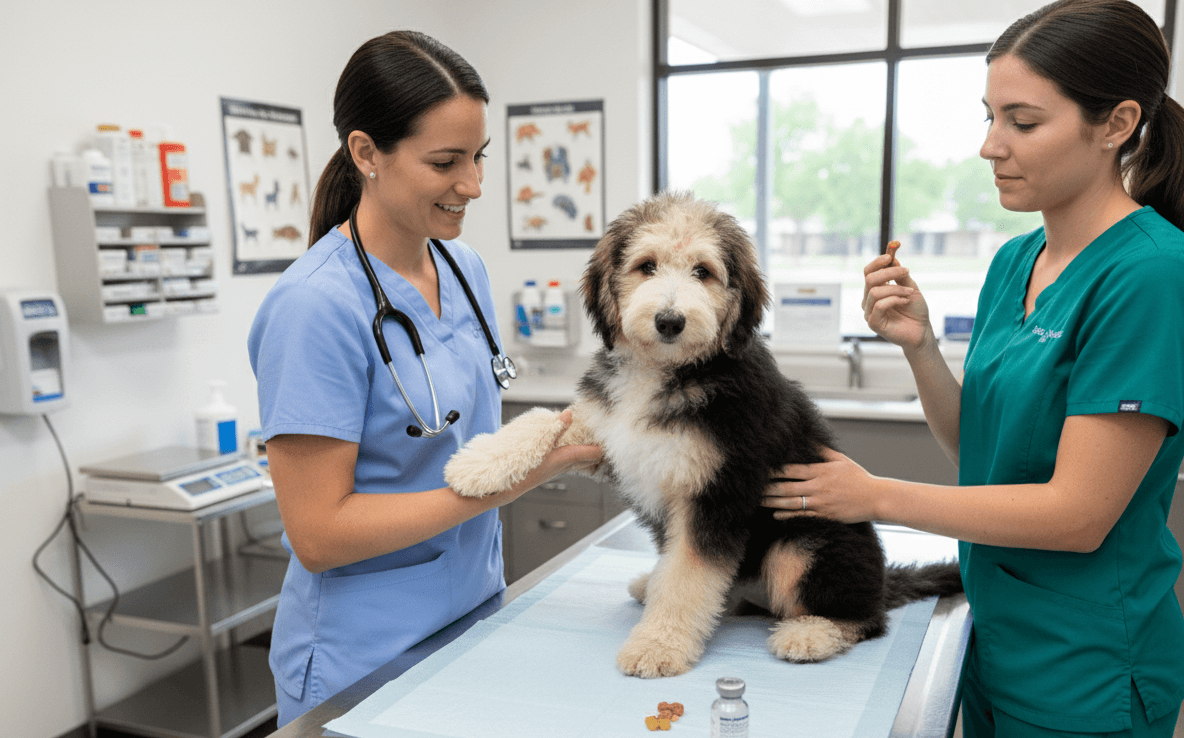
Vaccination & Vet Care Checklist for Your Puppy’s First Year
By Harpers Ferry Doodles · 9/5/2025 · 🕒 4 min read
Bringing home a new puppy is an exciting new chapter filled with snuggles, playtime, and plenty of unforgettable firsts. But along with the joy of puppyhood comes the responsibility of keeping your new companion healthy. One of the most important steps during your puppy’s first year is staying on top of their vaccinations and routine vet care. A clear plan not only helps protect your puppy from serious illnesses, but also sets the foundation for a lifetime of wellness. In this guide, we’ll walk through a simple, month-by-month checklist to make sure your puppy gets the best start possible.
First Vet Visit (6 Weeks Old & After Adoption)
At Harpers Ferry Doodles, every puppy has their first vet visit at 6 weeks old. During this appointment, they receive their first DHPP vaccine (protecting against Distemper, Hepatitis, Parvovirus, and Parainfluenza) and a full health check. This visit ensures each puppy is thriving, parasite-free, and ready to safely transition to their new families.
Once you bring your puppy home, it’s important to schedule a follow-up appointment with your veterinarian within the first 3 days. This visit serves a few key purposes:
Confirming good health – Your vet will do a head-to-tail exam to make sure your puppy is adjusting well and doesn’t show signs of illness.
Reviewing vaccination and deworming records – You’ll bring home detailed records from us; your vet will use them to continue the puppy’s vaccination series on schedule.
Discussing next steps – Your vet can answer questions about nutrition, parasite prevention, and the upcoming vaccine timeline tailored to your puppy’s needs.
This early check-up not only gives you peace of mind but also establishes care with your vet, which is invaluable as your puppy grows.
Puppy Vaccination Timeline (Core Vaccines)
Keeping your puppy on schedule with vaccines during their first year is essential to protect them from serious illnesses. Here’s a simple breakdown of what to expect:
6 Weeks (Breeder Visit)
DHPP – 1st dose (Distemper, Hepatitis, Parvovirus, Parainfluenza)
General health exam & parasite check (completed before going home)
8–10 Weeks (First Vet Visit After Adoption)
DHPP – 2nd dose
Bordetella (optional: recommended if your puppy will attend daycare, boarding, or puppy socialization classes)
12 Weeks
DHPP – 3rd dose
Bordetella booster (if given earlier)
Leptospirosis (optional: based on your vet’s advice and your area’s risk factors)
14–16 Weeks
DHPP – 4th dose (final puppy booster)
Rabies vaccine (required by law in most states)
Lyme disease & Canine Influenza (optional: depending on region/lifestyle)
6 Months
Growth & development check
Discuss spay/neuter timing with your vet
12 Months
DHPP booster
Rabies booster (as required by state law)
Annual wellness exam
Deworming & Parasite Prevention
Parasite prevention is just as important as vaccines when it comes to keeping your puppy healthy. At Harpers Ferry Doodles, all puppies are dewormed at 2, 4, 6, and 8 weeks old before going home. This schedule helps ensure that your puppy starts life free of common intestinal parasites, which can be passed from mother to puppy.
Once your puppy is home, it’s important to continue parasite prevention with your veterinarian’s guidance. Here are the basics to know:
Ongoing Deworming: Your vet may recommend additional deworming doses as your puppy grows, depending on test results and lifestyle.
Heartworm Prevention: Puppies typically begin a monthly heartworm preventative around 8 weeks of age. Heartworm disease is spread by mosquitoes and can be life-threatening if left untreated.
Flea & Tick Prevention: Year-round flea and tick prevention is recommended, even for indoor dogs, since pests can hitch a ride into your home. These preventatives usually come in monthly chewables or topical treatments.
Consistent parasite prevention protects your puppy from discomfort, illness, and long-term health problems — and it keeps your home environment safe, too.
Spay/Neuter Timeline
Deciding when to spay or neuter your puppy is an important part of their long-term health and wellbeing. While some smaller breeds are often altered as early as 6 months, most veterinarians now recommend waiting until 12 months of age or older for large breed dogs. This delay allows your puppy’s bones, joints, and hormones to fully develop, which can reduce the risk of orthopedic issues and certain long-term health concerns.
At Harpers Ferry Doodles, our puppy contract requires that all puppies be spayed or neutered by 2 years of age. This ensures responsible ownership while still giving families and their veterinarians flexibility in choosing the best timing for each dog.
When the time comes, your vet will consider factors such as your puppy’s size, growth rate, behavior, and household needs.
Because every puppy is unique, it’s best to work closely with your veterinarian to determine the most appropriate timeline. This partnership ensures your puppy gets the benefits of spay/neuter while also supporting healthy growth and development.
Closing Thoughts
Your puppy's first year is full of milestones, from learning new tricks to growing into their unique personality. Staying on top of their veterinary care — vaccinations, deworming, and preventive treatments — is one of the most important ways you can set them up for a lifetime of health and happiness.
At Harpers Ferry Doodles, we make sure every puppy leaves our care with their first vaccination, thorough health checks, and a strong start. From there, your veterinarian becomes your partner in keeping your pup thriving. Remember: every dog is unique, so always lean on your vet’s guidance when it comes to timing and care. With consistency and love, your puppy will grow into a healthy, happy member of your family for years to come!
This checklist is a general guide; always follow the specific advice of your veterinarian.
Keep Reading

Oct 7, 2025
How to Keep Your Bernedoodle’s Coat Tangle-Free Between Groomer Visits
Keep your Bernedoodle’s coat tangle-free between grooms with the right tools, simple brushing techniques, and an easy routine.

Sep 25, 2025
Giving Puppies the Best Start: ENS and ESI Explained
We use Early Neurological Stimulation (ENS) and Early Scent Introduction (ESI) to give our puppies a stronger start in life—building healthier bodies, sharper minds, and confident temperaments.

Aug 8, 2025
Table Scraps: The Good, the Bad, and the Dangerous
Not all table food is bad for your dog. Find out which scraps are safe, which to limit, and which can be dangerous to keep your Bernedoodle happy and healthy.